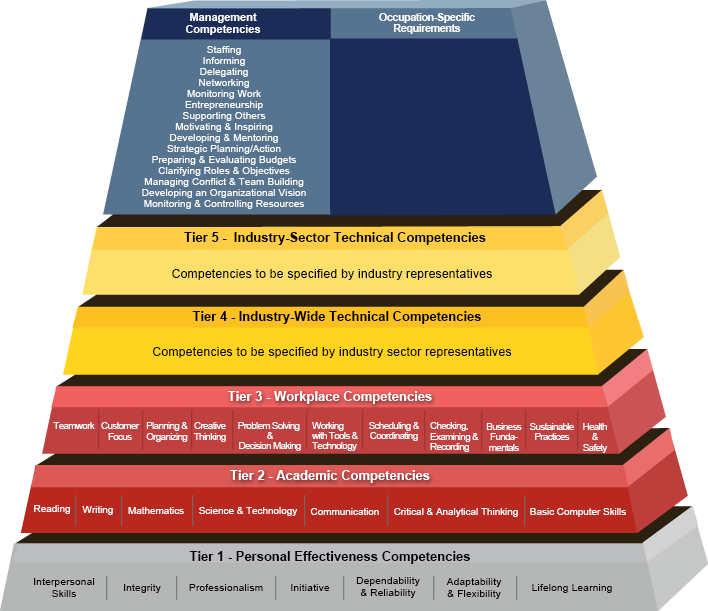The CMC's Building Blocks Model is a both a resource and a guide for authors experienced in competency modeling or those new to the process. The Building Blocks Model can be used to communicate fundamental workforce needs, as the basis for nationwide Industry Competency Models or custom competency models.
The Building Blocks Model consists of six tiers that serve as a framework for understanding competencies needed in a specific workforce. Tiers 1 through 3, known as the Foundational Tiers, provides fundamental skills required for success in a job. Tier 1 covers personal and interpersonal competencies, which might include soft skills like communication. Tier 2 involves academic and technical competencies typically learned in elementary and secondary school, forming the basis for higher-level skills. Tier 3 focuses on workplace competencies that enable individuals to function effectively in an organizational setting.
Tiers 4 and 5, referred to as the Industry Tiers, are specific to industries or subsegments. Tier 4 includes technical competencies applicable across an entire industry, while Tier 5 deals with more specialized competencies within industry subsegments. For example, Advanced Manufacturing is an industry sector on Tier 4, while competencies specific to the manufacturing of certain products, such as Semiconductors, go on Tier 5.
The Building Blocks Model framework aids in competency modeling efforts, helping developers identify the skills needed for various roles. Tier 6 acts as a placeholder for occupation-specific and managerial competencies, which are highly specialized and specific to jobs.
To ensure that the Building Blocks Model reflects the foundational knowledge and skills needed by today’s workforce, ETA conducts reviews of all models in the Clearinghouse to analyze various changes across industries. As such, the Building Blocks Model has been updated in Tiers 1-3 over time to reflect revised changes in employability skills, workplace health and safety, and digital skills. For a more detailed description of the changes, download the Summary of Changes.
The industry model frameworks are based on the Building Blocks Model and then modified to meet industry needs. Scroll down to view the Building Blocks or select an industry model from the left menu.
Download the industry model and worksheets in several formats

Generic Building Blocks Competency Model
